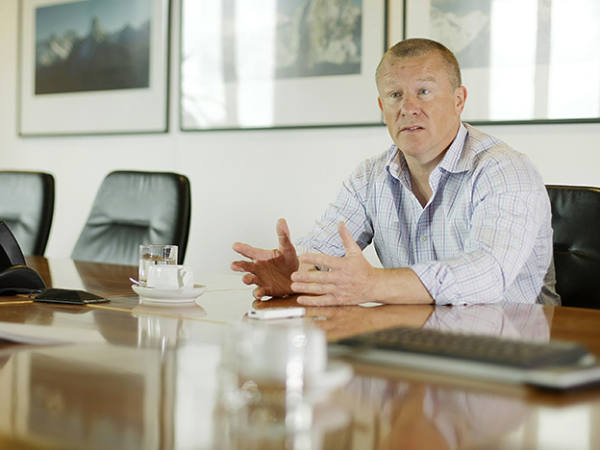When Mid Wynd International Investment Trust's manager of 15 years, Michael MacPhee, retired at the end of April the trust's board surprised the investment trust community by handing the reins over to Artemis Investment Management which focuses on open-ended funds, rather than sticking with established investment trust house Baillie Gifford. And the trust's new managers - Simon Edelsten, Alex Illingworth and Rosanna Burcheri - are going to run the portfolio in quite a different way.
"We have moved Mid Wynd deliberately into a more conservative group of long-term growth stocks, companies that can look after themselves in growing industries principally outside the UK, so this trust can sit comfortably alongside UK holdings," says Mr Edelsten.
UK-listed shares accounted for 11 per cent of assets at the end of July, down from 20.8 per cent before Mr Edelsten and his team took it over.
"We are looking to make it relatively low risk: if we enter more volatile markets the sort of companies we own tend not to get too buffeted by changes in conditions," he continues. "And we are not aiming to chop and change a lot as there are not many businesses we consider to be top quality. This means performance could be very different to the index, as at times when people are buying cyclicals we may not keep up because we do not own many of these. But quality companies tend to produce the best returns over the long run."
Under Mr MacPhee the trust had a higher volatility profile.
Mr Edelsten and his colleagues also manage an open-ended fund, Artemis Global Select, (GB00B5QKCK29), which over one year has under performed MSCI AC World NR GBP Index and the Investment Management Association Global sector average, putting it into the fourth quartile terms of performance.
"We do not own cyclicals and the market has gone up in more of a straight line than we expected," explains Mr Edelsten. "The market reached a point in the spring where we felt equity valuations were stretched - and we still do. We take a longer-term view, although we have gone cautious too early in Global Select."
Mid Wynd will have a number of differences with Global Select, for example it has around 60 holdings against more than 70 for the open-ended fund, and Mr Edelsten plans to include more illiquid holdings, such as frontier markets equities.
"We were very happy to have inherited East African Breweries (2.1 per cent of assets) which taps into growing affluence in this region," he says. "When valuations become attractive we will build up our frontier markets exposure."
Mid Wynd will be more focused on large thematic holdings and have a lower turnover. It has around two-thirds of Global Select's holdings but in a larger size. The trust's investment portfolio is structured around themes which fall into broad categories such as growing emerging markets consumption. This accounts for about a quarter of the assets, although Mr Edelsten says he is less enthusiastic about emerging markets than he was a couple of years ago.
"People got overexcited about this area and shares got very expensive. But where you can find value is among developed market companies which have developed successful businesses in emerging markets and have better top-line growth than their peers, but have sold off."
Recent purchases include France-listed LVMH. "The price is not that different to 2010 even though this company is highly cash generative and has a leading position selling branded goods into emerging markets," says Mr Edelsten.
"Meanwhile, emerging markets consumers are buying glasses for the first time while there is an aging population in Europe which also needs them. Glasses maker Essilor has sold off but has missed just two quarters' numbers and has good long-term track record. The market taking short-term views throws up opportunities."
Europe exposure has fallen and accounts for around 12 per cent of assets. "However, European property shares are not particularly well covered: I would liken this area to Japanese real estate investment trusts which have had a fantastic five years," he says. "We try to identify examples of successful investment trends, and if we have missed them we try and spot them in other markets."
Holdings include one of the largest property companies in Europe, Unibail Rodamco, which focuses on shopping centres in European cities. "This is doing well and is defensive: Unibail has gone up while markets have gone down," says Mr Edelsten.
Japan, meanwhile, accounted for around 2 per cent of assets when Mr Edelsten and his colleagues took over but at the end of July had risen to nearly 17 per cent. "Japan has underperformed this year but the economy is improving and always requires patience - not much happens overnight here," he explains. "When we took on Mid Wynd there were worries about the sales tax so ratings on domestic stocks were down. But one of our key measures is cash flow per share - and this is generally very good on Japan shares, so there is value for money in Japan."
Many Japanese companies are not in growing industries but there exceptions, such as Ebara, which accounts for 2.5 per cent of assets. "This dominates pump making for liquefied natural gas plants, while fracking in the US is causing its business to grow like fury," he says. "It has got so many orders at the moment it has not got enough plants in the US to meet this and needs to expand there. But because we are planning to take a long-term view we can look through medium-term issues."
His investment process includes looking at how much cash flow a company throws off, and he likes companies with a proven business model. But these can be prone to massive competition so he also tries to find companies in areas where there are barriers to entry, for example, the cost of getting into a business. Examples include Ebara, because it is hard to make the kind of pumps it does.
He also likes companies with good asset backing. "Companies with this attribute should have good capital protection because they don't need to run to banks in a recession," he says.










